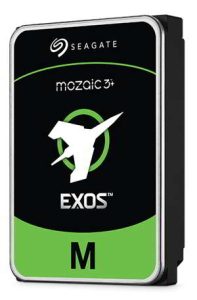Seagate Sampling Up to 36TB HAMR-Based Mozaic 3+ 3.5-Inch HDDs
10-platter product design
This is a Press Release edited by StorageNewsletter.com on January 21, 2025 at 2:01 pmSeagate Technology Holdings plc announced shipments of Exos M HDD samples to select customers in industry-leading capacities up to 36TB.
Based on Mozaic 3+, the company’s HAMR technology platform, Exos M delivers unprecedented storage scale for large-scale data center deployments.
Key Takeaways
-
Adopted by Cloud Service Providers: The company is currently ramping Exos M to volume shipments on capacity points up to 32TB with a leading cloud service provider. Separately, the firm is also sampling drives on the Exos M platform of up to 36TB.
-
Mozaic 3+ and HAMR Innovation: Based on Seagate’s Mozaic 3+ technology platform, the industry’s first implementation of HAMR, Exos M offers data center operators significant scale, TCO, and sustainability advantages, including 300% more storage capacity within the same data center footprint, a 25% cost reduction/TB and 60% reduction in power consumption/TB.(1)
-
Unrivalled Areal Density: Exos M, powered by HAMR-based Mozaic 3+ platform, now delivers capacity points up to 36TB through a highly efficient 10-platter product design. The company is the only data storage company that can achieve areal densities of 3.6TB/HDD platter today, with a pathway to increasing per-platter capacity to 10TB.
Quotes:
Infrastructure solutions provider Dell Technologies, Inc. is among the 1st customers to adopt Mozaic 3+ and will soon integrate Exos M 32TB into their high-density storage systems.
“As customers build out their AI factories, they need cost-efficient, scalable and flexible storage engineered to reliably handle the most demanding AI workloads,” said Travis Vigil, SVP, ISG product management, Dell Technologies. “Dell PowerScale with Seagate’s HAMR-enabled Mozaic 3+ technology plays a crucial role in supporting AI use cases like retrieval augmented generation (RAG), inferencing and agentic workflows. Together, Dell Technologies and Seagate are setting the standard for industry-leading AI storage innovation.”
“We’re in the midst of a seismic shift in the way data is stored and managed,” said Dave Mosley, CEO, Seagate. “Unprecedented levels of data creation – due to continued cloud expansion and early AI adoption – demand long-term data retention and access to ensure trustworthy data-driven outcomes. From capturing training checkpoints to archiving source-data sets, the more data organizations retain, the more they can validate that their applications are acting as they expect them to – and adjust course as needed.”
“Seagate continues to lead in areal density, sampling drives on the Exos M platform of up to 36TB today. Also, we’re executing on our innovation roadmap, having now successfully demonstrated capacities of over 6TB per disk within our test lab environments.”
“As the world’s leading producer of exabytes, and the only manufacturer capable of manufacturing 3.6TB per platter hard drives at scale, Seagate is laser-focused on delivering the storage scale required for the applications of the future,” Mosley added.
“As businesses and people everywhere continue to use AI applications, more widespread adoption of AI is creating unprecedented amounts of data. All this data needs to be replicated and retained for the long term,” said Kuba Stolarski, research VP, service provider infrastructure, IDC. “Our research shows that hard drives continue to be a critical technology for delivering this scale, with 89% of data stored in the data centers of leading cloud service providers stored via hard drive. We believe Seagate’s progress in areal density innovation positions them well to address increased demand for data storage.”
(1) Method: 10 to 30TB capacity upgrade when comparing Exos X10 to Exos M 30TB Mozaic drive, a common drive capacity needing upgrade at data centers today.















 Subscribe to our free daily newsletter
Subscribe to our free daily newsletter

